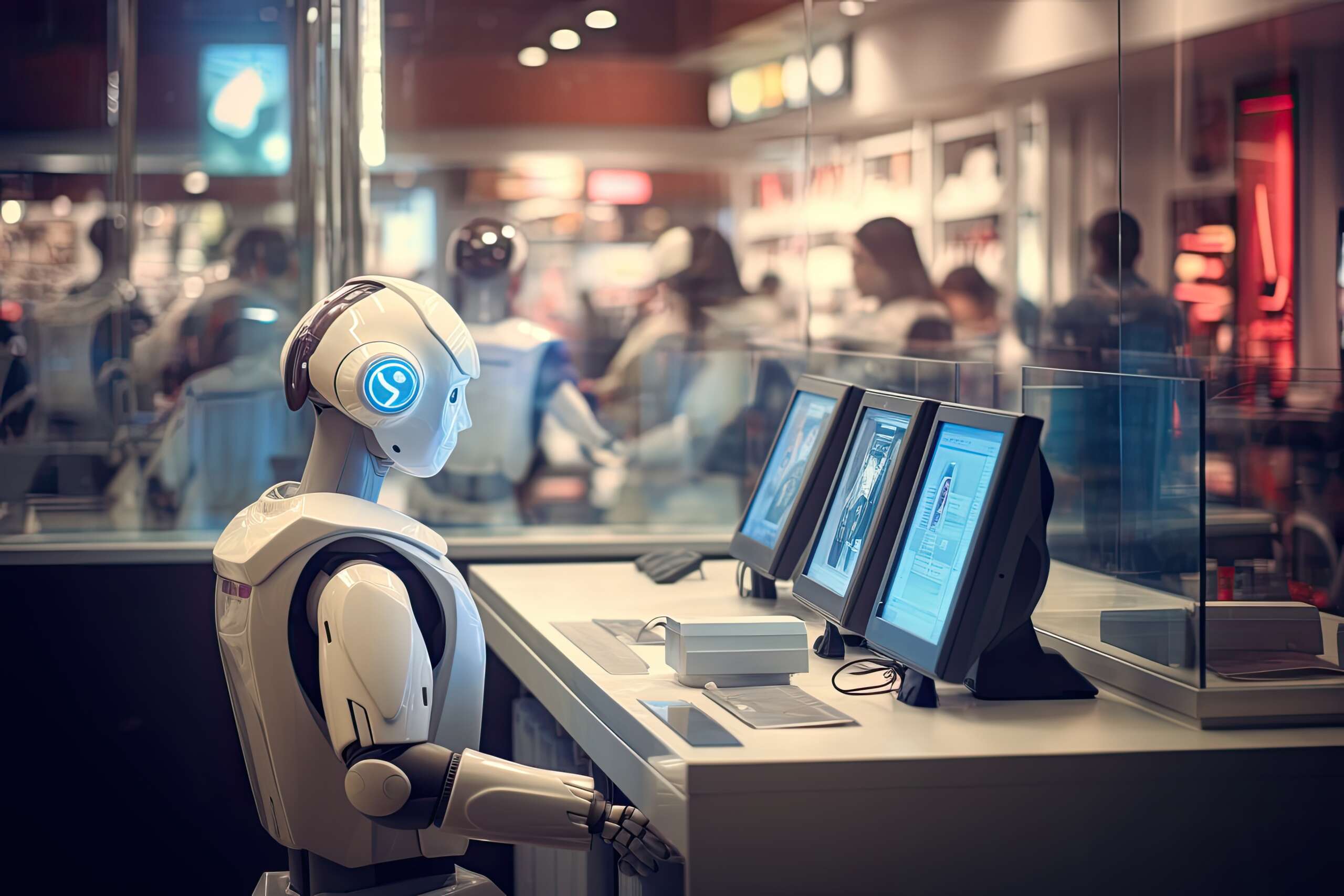In today’s world, every interaction with a brand can change everything. At a recent summit, 30 top Customer Experience (CX) experts came together. They talked about how AI in customer support is key to success.
AI promises to make customer service more personal, but there are challenges. A 2023 survey found employees think their companies are less empathetic with AI tools. It’s a big challenge to use AI without losing the human touch in customer service.
Despite the challenges, there’s hope. AI can create super-personalized customer experiences using lots of data. This could be like how Netflix or Amazon suggest things you might like, but for many different kinds of businesses. Companies are learning to use AI to solve problems before they happen.
AI and human touch are coming together in new ways in customer service. AI helps solve problems fast, but human empathy is still key for building trust. CX leaders see AI as a tool to make their services better and more creative.
This new era of CX is all about finding the right balance. Companies want to use AI’s power and still keep the human touch. It’s about creating a service that feels both high-tech and warm.
The Strategic Necessity of AI in Modern Customer Experience
The way we handle customer service is changing fast, thanks to artificial intelligence. This move to AI-powered customer support transformation is essential today. Companies see the big value in improving customer experience with AI. This tech boosts efficiency and makes customers happier.
Experts like McKinsey say AI could add $25.6 trillion to the global economy. This shows how vital AI is for business plans. AI helps with many tasks, like predicting what customers need and offering help right away. These tools are key to AI for customer satisfaction, making interactions better and processes smoother.
Technologies like machine learning and natural language processing look into customer data deeply. They offer personalized advice and services ahead of time. This level of personal touch and prediction sets companies apart in how they handle customer needs.
Microsoft predicts that by 2025, 95 percent of all customer interactions will use AI. This shows how much we rely on AI to improve and manage customer interactions. Big names like Amazon use AI for more than just talking to customers. They also use it for smart shipping, making orders arrive faster and more efficiently.
Improving service quality across different channels helps keep customers coming back. Companies that do this well keep almost 90% of their customers. Keeping customers is key for growth and staying in business, making AI crucial for customer care.
Adding AI to customer support is more than just automating tasks. It changes how businesses talk to their customers, making it a must-have in today’s market. As AI grows, its role in shaping customer support and satisfaction will only get more important.

Enhancing Customer Experience with AI
As technology changes, AI-powered customer interactions are making a big difference. They’re not just an upgrade; they’re changing how brands talk to customers. A McKinsey report says AI could add $25.6 trillion to the global economy by making customer interactions better.
AI-enhanced personalized service is changing how companies talk to customers. For example, Amazon uses AI to understand what customers like, making shopping more personal. Starbucks uses Deep Brew AI for personalized marketing, which helps keep customers coming back.
SurveySparrow and Liberty London show how AI helps understand customer feedback better. They use AI to make sense of customer opinions, making support more effective. Liberty London uses Zendesk AI to know what customers want and feel, making support more personal.
AI can also predict what customers will want, helping businesses keep them happy. This is key during busy times like holidays or new product launches. For instance, Grove Collaborative uses AI to offer personalized help, showing how AI can improve customer service.
In conclusion, AI is becoming key in customer support as businesses go digital. It automates responses and predicts what customers need. This makes customer interactions smoother and more personal, setting new standards for service in the digital world.
Key Benefits of AI-Powered Customer Interactions
AI has changed customer service for the better, making interactions more efficient and high-quality. Now, personalized customer service with AI lets businesses meet individual customer needs. Studies show that 80% of people prefer brands that offer personalized experiences.
Improving customer experience with AI is key to making customers happy and loyal. AI helps companies answer customer questions fast and accurately, making service smooth. For example, AI-powered quality assurance systems check interactions to keep service consistent and precise.
Companies are investing a lot in AI for customer service. 52% of them spend more than five percent of their digital budget on AI. And 63% plan to increase their AI spending in the next three years. This shows how AI solutions bring big benefits through better efficiency and lower costs.

AI helps improve traditional support roles and gives agents better insights into what customers want. This leads to better handling of customer cases. AI also cuts down on the need to escalate issues and makes solving problems more accurate.
As businesses grow, the link between AI and customer service will get stronger. Making customer interactions personalized and efficient will become essential. With each new tech advancement, companies see more value in using AI. This gives them a competitive edge in today’s fast-paced market.
Real-World Success Stories: AI Transforming Customer Service
The use of AI in customer engagement and AI-enhanced support systems is changing how companies talk to their customers. Companies in many fields are using these tools to make their services better and customers happier. For example, Amazon uses AI to suggest products that match what customers like, making shopping better for everyone.

In the food industry, Starbucks uses Deep Brew AI to plan staff schedules and manage drive-thru orders. This means customers get their orders fast and right. In beauty, Sephora lets customers try products virtually with its Virtual Artist AR app, making shopping more fun.
SurveySparrow’s text sentiment analysis gives deep insights into what customers feel. This helps businesses improve by knowing how customers are feeling right now. It makes AI-enhanced support systems work better.
AI is used in many ways, from predicting what customers will want to tracking how they feel in real-time. Big companies are getting more efficient and making customers happier. They’re also showing what AI can do in making customer service better.
With such strong examples, it’s no wonder 65% of customer experience leaders see AI as key to their success. As companies keep using these new technologies, customer service will get more personal and quick, thanks to AI.
Implementing AI for Long-Term Customer Satisfaction and Growth
Businesses looking to grow in the digital world must use AI for customer support. This starts by looking at what customers need and how AI can help. Using AI makes customer experiences better, which is key for growth and staying ahead in the market.
Companies like Stitch Fix and sweetgreen use data to make customer experiences unique and satisfying. Even in tough markets, like Brinks Home, using AI and historical data helps them grow. AI helps make sense of big data, giving insights into what customers want, which leads to better service.
This is important for businesses wanting to succeed. Using AI helps with managing inventory, improving customer interactions, and making marketing more personal. These strategies are used in many industries.
But, using AI is complex and comes with challenges like data privacy and costs. To overcome these, a good strategy is needed. It should include learning, deploying AI step by step, and protecting data well.
Companies like Podium show how small businesses can use AI to improve operations and customer experience. By using AI wisely, companies can offer services that are predictive and personal. This helps them stay competitive and adapt to new trends.
AI’s ability to understand what customers need, with ethical use and good human-AI teamwork, will shape a new era of customer support. This support will not just react to customers but actively improve their experience.



